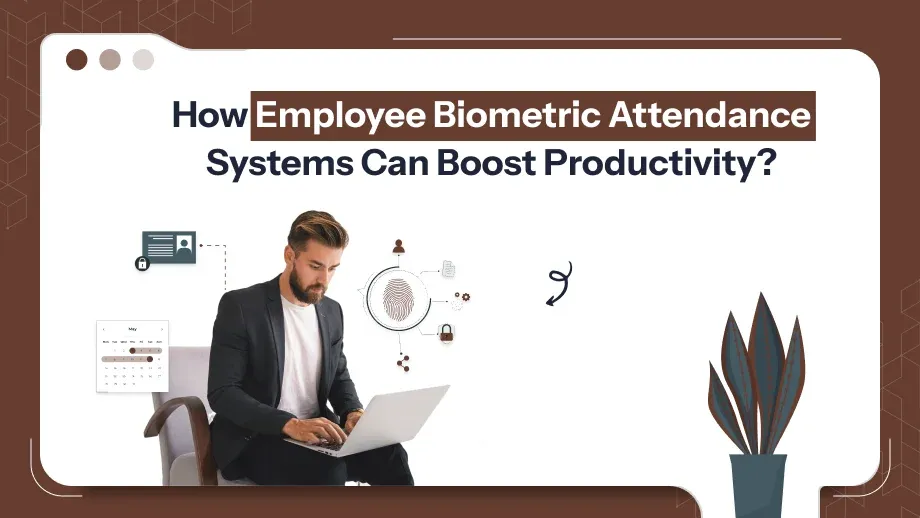
Introduction
Today’s fast-moving workplace environment calls for correct and efficient attendance management. Error-prone, time-theft-ridden, and administrative hassles that traditional attendance systems lead to result in a call for something like employee biometric attendance systems. These systems employ some unique biological markers like fingerprinting or facial recognition hence very accurate, secure, and user-friendly in recording attendance.
This blog explores how biometric systems revolutionize attendance management, why they are a must-have for organizations, and how they outperform traditional methods.
What is an Employee Biometric Attendance System?
An employee biometric attendance system for employees is one of the modern tools, and it applies biometric data in the monitoring of attendance; this would include fingerprints, facial recognition, or even iris scanning. It ensures that only an employee is the one that marks their attendance, excluding buddy punching and other kinds of fraudulent activities from happening.
Key Features of Biometric Attendance for Employees:
- Unique biological markers for authentication.
- Real-time tracking of clock-ins and clock-outs.
- Seamless integration with payroll and HRMS software.
- Accessibility for remote and hybrid work environments.
These systems are part of a larger biometric attendance management, which ensures smooth and efficient tracking across departments and locations.
Comparing Biometric Attendance with Traditional Methods
| Aspect |
Traditional Methods |
Biometric Systems |
| Accuracy |
Highly susceptible to mistakes and theft, like the practice of buddy punching. |
Highly accurate and secure, eliminating attendance fraud. |
| Cost |
Lower initial cost but higher long-term administrative expenses. |
Higher initial investment with long-term cost efficiency. |
| Ease of Use |
Manual tracking, reconciliation, and risk of human errors. |
Automated and seamless tracking, reducing HR workload. |
| Integration |
Limited integration with other systems, requiring manual efforts. |
Seamlessly integrates with HRMS, payroll, and analytics systems. |
| Scalability |
Challenging to scale for multi-location or large workforces. |
Easily scalable for organizations of all sizes. |
| Employee Accountability |
Minimal enforcement of punctuality or fairness. |
Promotes punctuality and eliminates disputes. |
| Data Insights |
Minimal or delayed insights, making trend analysis difficult. |
Real-time data and analytics for informed decision-making. |
These comparisons illustrate why biometric attendance systems are a better choice for organizations that are looking to improve their efficiency.
How Employee Biometric Attendance Systems Boost Productivity?
Real-Time Attendance Tracking
Biometric attendance for employees using biometrics allows the company to monitor time-to-date attendance. It eliminates delays in the tracking process the process of reconciliation, tracking, and approvals and streamlines the entire process for HR departments.
Eliminating Time Theft
These conventional attendance systems have issues related to time theft and buddy punching. Biometric systems help because they ensure that only the actual employee can mark their attendance, hence promoting responsibility and fairness.
Reduced Administrative Work
Automating attendance tracking minimizes the need for manual data entry, reducing errors and saving valuable time for HRMS Payroll Software in India teams.
Enhanced Data Analytics
Modern attendance systems are integrated with advanced reporting tools to generate employee biometric attendance reports. These provide real-time visibility into employee punctuality and absenteeism, as well as productivity trends. That way, organizations can better base their decisions.
Support for Remote and Hybrid Workforces
With the trend of flexible work environments, employee biometric attendance systems ensure accurate tracking for remote and hybrid employees. Accessibility can be provided through cloud-based platforms.
Effortless Attendance Starts Here!
Tired of outdated systems? Switch to Employee Biometric Attendance for accuracy, fairness, and productivity.
Top Features That HR Professionals Look For in Biometric Attendance Systems
The right biometric attendance system that is properly designed could be an important game changer for HR specialists. The processes can be improved and the efficiency of organizations can be increased. Below are the top features HR teams prioritize when evaluating these systems:
Seamless Integration
Modern HR operations rely on interconnected systems. A robust Biometric Employee Attendance System should easily integrate with:
- HRMS software solution for centralized data management.
- Payroll systems for automating the calculation of salary based on attendance.
- Other workforce management tools to enhance operational efficiency.
It creates a single system for HR functions across all.
Scalability
Growing organizations need solutions that can scale effortlessly. Whether managing a small team or a global workforce, the biometric system must:
- Handle multiple locations and varied shift schedules.
- Adapt to organizational growth without compromising performance.
- Support remote and hybrid workforces with cloud-based accessibility.
Scalability ensures the system remains effective as the organization evolves.
Advanced Reporting Capabilities
HR professionals rely on data-driven decisions, making reporting a critical feature. A good system provides:
- Real-time employee biometric attendance for punctuality and absenteeism.
- In-depth analytics on the productivity of employees and their managing time.
- Customizable reports for compliance and performance reviews.
These insights help HR teams identify trends, address issues, and optimize workforce planning.
User-Friendly Interface
The system must be user-friendly and user-friendly for both HR departments and employees.
Key considerations include:
- Simple clock-in/out mechanisms, such as biometric fingerprint attendance system or facial recognition.
- The dashboard provides an extensive view of attendance information.
- Mobile-friendly options through Biometric Attendance Apps for on-the-go accessibility.
An intuitive interface reduces the learning curve and encourages adoption.
Enhanced Security
With sensitive employee data at stake, security is non-negotiable. Biometric systems must include:
- Advanced encryption to safeguard biometric and attendance data.
- Compliance with global and regional data protection regulations like GDPR.
- Secure storage for security to prevent a security breach or access that is not authorized.
Benefits of Biometric Attendance for Employees
The implementation of employee biometric attendance doesn’t only benefit companies, it can also improve the user experience in a variety of ways. Prioritizing precision, and fairness, as well as the ease of use of biometric systems helps make for a more effective and transparent work environment.
Transparency and Trust
- Correct Attendance Record: Biometric systems prevent mistakes made by hand and theft of time making sure that attendance records are precise and reliable.
- Fair evaluation: The employees are assured that their time and hours are recorded in a fair and impartial manner that creates a sense of fairness between employees.
- The ability to access real-time information in real-time: employees can quickly access their attendance records by using apps or websites and reduce confusion regarding hours, leaves, or tardy departures.
Fairness and Accountability
- Eliminates Cheating: Biometric systems will prevent buddy punching or proxy attendance because they rely on unique biological markers like fingerprints or facial recognition. This way, everyone is accountable.
- Promotion of Punctuality: The fact that attendance is recorded effectively motivates employees to reach the office on time, making the workplace disciplined.
- Clear Policies: As attendance is directly linked to payroll and performance, the employees clearly understand how their attendance affects their evaluations and benefits.
Simplified Attendance Processes
- No Punching: Employees do not have to remember their IDs or passwords; the biometric systems make clocking in and out smooth and hassle-free.
- Faster Approvals for Leaves: Integrated systems allow employees to apply for leaves or view their balances directly. This eliminates delays in approvals and communication gaps.
- Remote Accessibility: For hybrid or remote workers, employee biometric attendance systems enable attendance logging from any location, ensuring convenience without compromising accuracy.
Role of Online Biometric Attendance Systems
Online Biometric attendance systems on the internet have become popular due to their versatility and ease of use. Cloud-based services allow companies to control the attendance of on-site as well as remote and hybrid employees with ease.
Advantages of Biometric Attendance System Online:
- Remote access for managers and HR professionals.
- Real-time syncing of attendance data.
- Integration with payroll systems for timely salary processing.
- Support for mobile devices through employee biometric attendance apps.
Such systems are transforming how organizations manage employee attendance, ensuring efficiency across diverse work environments.
Overcoming Concerns About Biometric Systems
- Data Privacy: Biometric systems often raise concerns about data security. Modern solutions use advanced encryption techniques and conform to global regulations on data security, such as GDPR.
- Costs for Initial Investment: While the initial investment into Biometric Attendance Management may be costly, the benefits over time like fewer frauds, cost of administration, and a rise in efficiency outweigh any costs.
- Employee Acceptance: A new system, like a biometric attendance management system, may face initial resistance. A clear explanation of its advantages like enhanced accuracy and more efficient attendance tracking, as well as its simplicity of use, could help build trust among employees.
How to Choose the Right Biometric Attendance System?
The right choice of system is a thorough analysis of your business’s needs. Here are key considerations:
- Integration Capabilities: Confirm that it is fully compatible with the existing time attendance management software.
- Scalability: Select an option that will grow as your company grows.
- User-Friendly Interface: Identify systems through intuitive dashboards and mobile applications.
- Cost is compared to. ROI: Consider the benefits that come from making investments in a solid system.
The Future of Biometric Attendance Systems
In terms of the future of biometric attendance systems, they have a bright future, due to AI-based facial recognition as well as multi-factor authentication. These innovations promise even greater accuracy, security, and integration capabilities. As hybrid and remote work models gain increasing popularity, online biometric attendance systems will continue to remain a cornerstone of efficient workforce management.
Conclusion
The need for efficiency and accuracy makes employee biometric attendance systems a revolutionary workforce-attendance management system, integrating real-time tracking with a guarantee to eliminate fraud, from easing HR and payroll processes for the organization.







